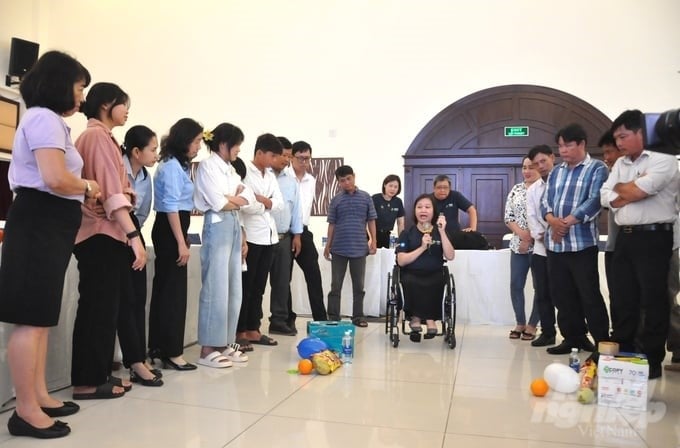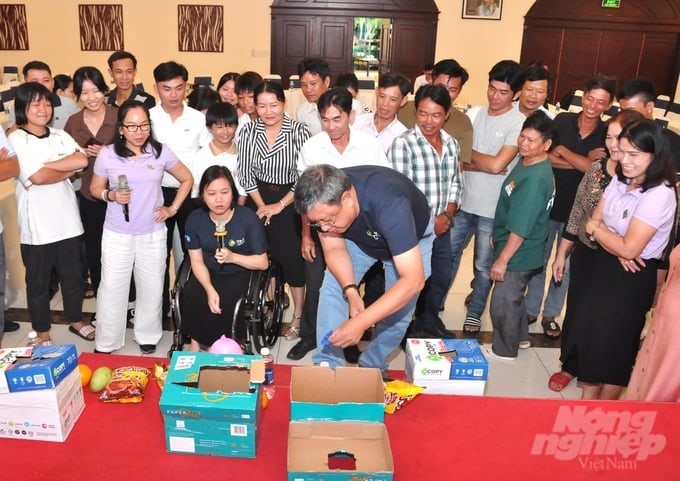November 19, 2025 | 02:30 GMT +7
November 19, 2025 | 02:30 GMT +7
Hotline: 0913.378.918
November 19, 2025 | 02:30 GMT +7
Hotline: 0913.378.918
On July 15, in Rach Gia city (Kien Giang), the Department of Crop Production (Ministry of Agriculture and Rural Development), in collaboration with the Netherlands Development Organization (SNV), organized training to improve capacity to practice gender equality and social justice under the goal of green growth in implementing the 1 million hectares of high-quality rice project in the Mekong Delta.

The training is organized in the form of team games, so it is quite interesting and easy to understand, attracting a large number of students to participate. Photo: Trung Chanh.
Attending the training class were leaders of the Department of Agriculture and Rural Development, the Department of Crop Production and Plant Protection, community agricultural extension officers, the Office for People with Disabilities under the Department of Labor, War Invalids and Social Affairs, the Provincial Women's Union, leaders of districts and communes with cooperatives building models, and members of cooperatives participating in the 1 million hectares of high-quality rice project.
This is the first training class in 7 locations to implement the pilot model of the Sustainable Development Project of One Million Hectares Specializing in High-Quality and Low-Emission Rice Cultivation Associated with Green Growth in the Mekong Delta until 2030 (referred to as the 1 million hectares of high-quality rice project).
During one day, trainees were trained and shared by experts to understand disability and disability integration, barriers for people with disabilities, and methods to overcome barriers and integrate disability integration in the activities of the 1 million hectares of high-quality rice project.
Trainees were also trained in basic knowledge about gender and gender equality, gender issues in rice production and business, and gender integration in activities of the project of 1 million hectares of high-quality, low-emission rice associated with green growth in the Mekong Delta. The training is organized in the form of team games, so it is quite interesting and easy to understand.
Vietnam is aiming to build a more sustainable and competitive agriculture. But economic transformation also affects women as well as many different ethnic groups. Women have limited access to land ownership to access credit and secure their livelihoods. Women and ethnic minority groups are often involved in labor-intensive, lower-value activities in the agricultural value chain.

Trainees participate in training. Photo: Trung Chanh.
On small farms in the Mekong Delta, women participate in household decisions about input purchases and selling prices for products such as rice and vegetables. However, women's control over decision-making decreases as agricultural businesses grow. Therefore, women often participate less in large production investment activities. Women have limited access to resources to be able to take advantage of business development opportunities in growing agricultural fields.
Mr. Le Huu Toan, Director of Kien Giang Department of Agriculture and Rural Development, said that implementing the project of 1 million hectares of high-quality, low-emission rice associated with green growth in the Mekong Delta, Kien Giang province registered a production area of 200,000 hectares. . Kien Giang implemented the project's pilot models at Phu Hoa Youth Services Cooperative (Tan Hiep district) and Thanh An Shrimp-Crab-Rice Cooperative (An Minh district). These are two specific rice production areas of Kien Giang province, including the rice-shrimp area in U Minh Thuong districts and the area specializing in rice cultivation with 2-3 crops/year in Tan Hiep district.
Translated by Thu Huyen

(VAN) Integrating agricultural extension activities with ecotourism development unlocks promising new avenues for localities boasting specific advantages in grape and apple cultivation.

(VAN) Enterprises and cooperatives accompany farmers in Tay Ninh to develop an organic seedless lime growing area, paving the way for poverty reduction.

(VAN) There were times when Pho faltered, yet his aspiration to bring the pure aroma to those who truly value clean tea kept urging him forward.

(VAN) Bich Thao Coffee Cooperative pioneered products achieving the national 5-star OCOP standard, paving the way for Son La coffee to conquer international markets.

(VAN) The Bao La bamboo-and-rattan cooperative has been producing goods integrated into value chains. As a result, its products have reached global markets.

(VAN) The training course in An Giang equips learners with emission verification methods, thus creating a basis for low-emission rice production.

(VAN) Thu Lum commune is focusing on developing medicinal plants under the forest canopy, creating sustainable livelihoods for local people, and contributing to protecting the ecological environment.